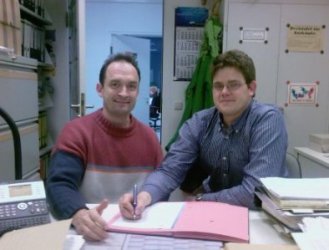News Archive
Ultrafast molecular movies
The CEF is pleased to announce that Jens Bredenbeck (born 1975) has been appointed W3 professor for Experimental Biophysics and Chemical Physics at the Faculty of Physics of the Goethe University in the summer term 2010.

Fig. 1. Dean Dirk Rischke (l.) and Jens Bredenbeck (r.) on the day the contract was signed.
Jens Bredenbeck studied Chemistry in Darmstadt and Göttingen and carried out his diploma research at the Max Planck-Institute for Flow Research. His scientific career led to Berlin, Zurich and Amsterdam. His decission to return to Germany in 2007 came with a Sofja-Kovalevskaja Award from the Alexander von Humboldt-Foundation, allowing Jens Bredenbeck to start a junior research group in Frankfurt. He joined the CEF as an Adjunct Invetigator oin 2007. In 2009 Jens Bredenbeck received the ADUC award of the German Chemical Society (GDCh). In 2010 he was promoted to principal investigator status of the CEF.
Jens Bredenbeck is married to biologist Dr. Andrea Weidt. They have an 8 months-old son. The couple enjoys mountain hiking and playing underwater rugby in their spare time.
Research Interests
Molecular motions are the driving force behind countless important processes at the intersection of chemistry, biology and physics. Processes such as chemical reactions, the function of catalysts, biological energy production and transfer, the function of enzymes, protein folding or biological signalling all are based on very fast dynamics on the molecular level. Molecular motions occur over a wide range of time scales down to the regime of femtoseconds (a millionth of a billionth of a second). To follow such molecular motions in real time and in this way achieve a better understanding of molecular function is the goal of the Jens Bredenbeck and his research group.
To make such ultrafast real time studies possible, Jens Bredenbeck's research focusses on the development and application of state of the art laser spectroscopy methods, in particular two-dimensional IR spectroscopy (2D-IR). The emerging technique of two- or multi-dimensional IR spectroscopy employs a sequence of femtosecond infrared laser pulses to measure coupling and energy transfer between molecular vibrations through bonds and through space. In this way, information on molecular structure can be obtained with extremely high time resolution to cover all relevant time scales of molecular motion.

Fig. 2. Jens Bredenbeck with an ultrafast 2D infrared spectrometer for meassuring fast molecular dynamics.
In the Bredenbeck group, these methods are currently applied to protein folding and function, protein-ligand interaction, the dynamics of artificial light controlled proteins and biomimetic systems, energy transfer processes in biomolecules, chemical reaction dynamics as well as the dynamics of hydrogen bonded systems in the context of solvation, molecular recognition and catalysis. See www.biophys.uni-frankfurt.de/~bredenbeckfor further information.
Contact: Prof. Dr. Jens Bredenbeck, Institut für Biophysik, Fachbereich Physik, Max-von-Laue Str. 1, 60316 Frankfurt/Main, Germany, Tel. +49 (0)69 798-46428, bredenbeck@biophysik.org

